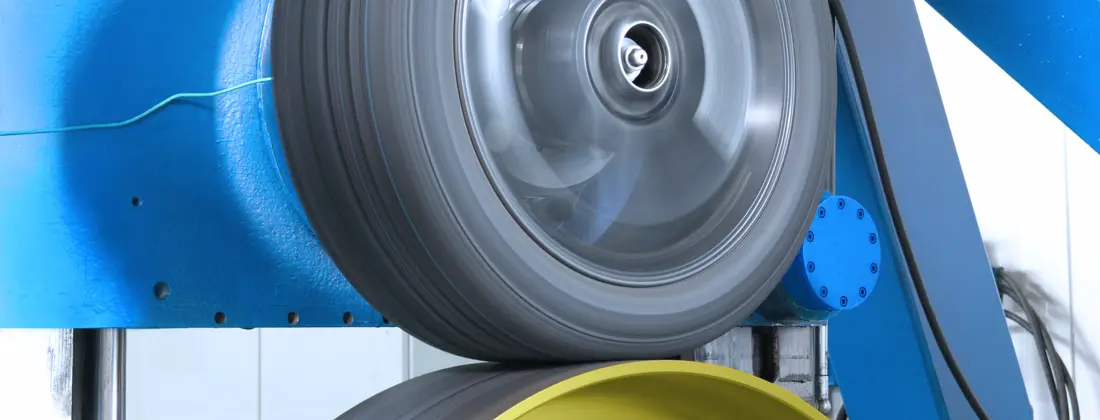ASTM E1136 Standard Reference Tyre Performance Test
The ASTM E1136 standard is a crucial benchmark in the tyre industry, providing a standardized method for evaluating the performance of tyres under controlled conditions. This test focuses on determining the resistance to abrasion and wear rate of tyres using an abrasive wheel. It ensures that manufacturers can compare their products consistently across different brands and models.
The test is particularly important as it helps in assessing the durability and longevity of tyres, which are critical factors for both consumers and fleet operators. By adhering to ASTM E1136, laboratories can provide reliable data that informs purchasing decisions and ensures compliance with industry standards.
Before conducting the test, it is essential to prepare the tyre specimens properly. The tyre should be cut into a specific shape and size as per the standard's specifications. This preparation allows for accurate measurement of wear and abrasion resistance during the testing process. Once prepared, the specimen is mounted onto an abrasive wheel which rotates at a controlled speed.
The test involves measuring the remaining thickness of the tyre after it has been abraded against the rotating wheel over a specified time period or distance traveled. The rate at which the tyre wears down provides insights into its durability and abrasion resistance. This information is vital for manufacturers to improve their products, as well as for buyers who need to make informed purchasing decisions based on performance data.
ASTM E1136 also specifies acceptance criteria that must be met by tyres passing the test. These criteria ensure that only tyres meeting strict quality standards are approved for use in various applications. Compliance with these standards is mandatory, as they set the benchmark for tyre durability and safety.
| Application | Description |
|---|---|
| Fleet Management | Evaluating tyre performance for large-scale fleet operations to optimize maintenance schedules and reduce costs. |
| Consumer Guidance | Providing consumers with reliable data on tyre durability, helping them choose the right tyres for their driving needs. |
Quality and Reliability Assurance
The ASTM E1136 test plays a pivotal role in quality assurance by ensuring that tyre manufacturers meet stringent performance standards. By adhering to this standard, laboratories can provide consistent and reliable data that reflects the true performance of tyres under controlled conditions. This consistency is crucial for maintaining trust among consumers and industry stakeholders.
Quality control measures are critical during every stage of the testing process, from specimen preparation to final analysis. Rigorous adherence to ASTM E1136 ensures that any discrepancies in test results can be attributed to variations in tyre quality rather than inconsistencies in the testing method. This reliability enhances confidence in the data provided by laboratories.
For manufacturers, meeting ASTM E1136 standards translates into better product development and improved market competitiveness. By producing tyres that consistently meet or exceed these standards, companies can gain a competitive edge in the tyre industry. Additionally, compliance with this standard helps to maintain high safety standards for vehicles worldwide.
In conclusion, the ASTM E1136 test is an indispensable tool for quality assurance and reliability in the tyre sector. Its role in ensuring consistent performance across different brands and models cannot be overstated. By leveraging this standard, laboratories can provide accurate and reliable data that benefits both manufacturers and consumers.
Use Cases and Application Examples
| Use Case | Application Example |
|---|---|
| Fleet Management Optimization | Testing tyres used in a large commercial fleet to identify the most durable and cost-effective tyre models. |
| Consumer Guidance | Providing consumers with detailed reports on tyre performance, helping them select appropriate tyre types for their driving conditions. |
The ASTM E1136 test finds extensive application in various sectors within the automotive industry. In fleet management, this test is instrumental in optimizing maintenance schedules and reducing overall costs by identifying the most durable tyre models. For consumers, it provides valuable insights into tyre performance, enabling informed purchasing decisions.
Another significant use case involves tyre manufacturers who rely on ASTM E1136 to ensure their products meet stringent quality standards. This standardization promotes consistency in tyre performance across different brands and models, enhancing overall safety and reliability for consumers worldwide.





